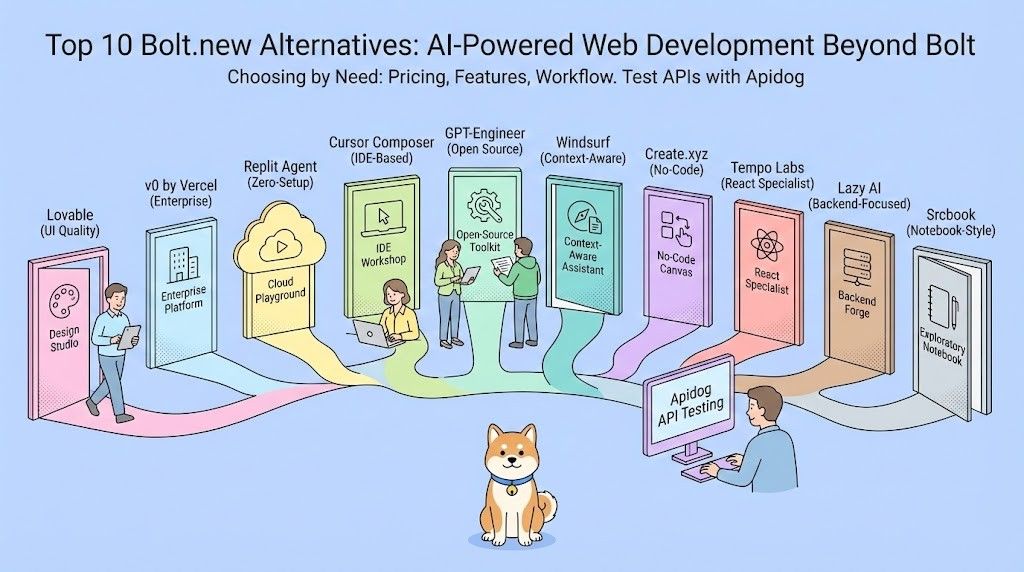APIs are changing how businesses work with data, and Azure API Management by Microsoft is a popular choice. However, different businesses have different needs, so one solution doesn't always fit all. That's where the growing list of Azure API Management alternatives comes in!
These options offer unique features, like easy-to-use interfaces and strong analytics tools. Let’s explore the best alternatives available and find the right fit for your organization's needs and goals!
Click Download Button Below👇👇👇
How Does API Management Work
API Management is a digital maestro, conducting the symphony of software interactions. It's all about ensuring that different software applications talk to each other smoothly, through something called APIs (Application Programming Interfaces). Think of APIs as secret handshakes allowing software to share information and work together.

Here's a quick rundown:
Publishing APIs: It's like unveiling a masterpiece. The organization releases its APIs, inviting developers to use them in their creations.
Controlling Access: Not everyone gets backstage passes. API Management decides who can use these APIs, setting up exclusive access for the right crowd.
Usage Policies and Rate Limiting: It's the traffic cop of the digital world. Like road rules keep traffic in check, API Management sets policies to prevent overuse and misuse.
Performance Analysis: This is the report card. Just like teachers assess students, API Management tools evaluate API performance to ensure they're top-notch.
Security Measures: Think of it as the digital bodyguard. API Management protects these APIs from unwanted intrusions, keeping the digital space safe.
Developer Engagement and Documentation: It's like having a helpful guide. API Management provides resources and support to developers, helping them navigate and use APIs effectively.
11 Azure API Management Alternatives
• Postman
• Amazon API Gateway
• MuleSoft Anypoint Platform
• Axway Amplify API Management
• WSO2 API Manager
• Apigee API Management Platform
• Kong Gateway
• Azure Functions
• Anypoint Platform
•Oracle API Platform Cloud
1. Apidog
Apidog is the go-to solution for teams that prioritize a seamless user experience. It's tailored for businesses looking for an API management tool that is both powerful and easy to navigate, eliminating complex interfaces. The platform's real-time collaboration feature stands out, enabling teams to work together on API projects without the hassle of coordinating across different tools. This makes Apidog an ideal choice for dynamic teams seeking efficient workflows.

Key Features of Apidog:
Intuitive Interface: Boasts a straightforward and visually appealing design, making navigation and usage effortless for all users, regardless of their technical expertise.

Real-time Collaboration: Enables teams to simultaneously work on API designs and documentation, ensuring seamless teamwork and improved productivity.
Version Control: Offers robust version management tools, allowing easy tracking and management of different API versions.
API Mocking: Provides built-in services to create simulated responses from APIs, enabling testing without the need for a live backend.
Analytics: Delivers insightful analytics on API performance and usage, helping in making data-driven decisions.
2.Postman API Platform
Postman is renowned for its all-encompassing suite of tools that cover every aspect of API development. This platform is a perfect match for teams that need an integrated environment for the design, testing, documentation, and sharing of APIs. Its automated testing capabilities are a highlight, appealing to organizations that prioritize reliability and performance in their APIs.

Key Features of Postman
Comprehensive Toolset: Equipped with a broad range of tools supporting every stage of API development - from design to testing, documentation, and sharing.
Automated Testing: Allows the execution of automated tests to ensure API reliability and performance, using tools like Newman and Postman Monitors.
Collaborative Features: Supports team-based workflows with shared workspaces, enabling multiple users to access and collaborate on API collections.
Documentation Generation: Automates the creation and maintenance of API documentation, making it easily accessible to developers.
Protocol Support: Accommodates a variety of API protocols including REST, SOAP, and GraphQL, offering versatility in API development.
3.Amazon API Gateway
Amazon API Gateway is the ideal choice for businesses deeply invested in the AWS ecosystem, and looking for a solution that seamlessly integrates with other AWS services. It's specifically designed for handling APIs at scale, offering features like custom developer portals and effective traffic management, which are essential for large-scale, cloud-native applications.

Important Features
AWS Integration: Seamlessly integrates with AWS services, providing a cohesive and robust cloud experience.
Developer Portals: Facilitates the creation of custom developer portals, enhancing engagement and simplification for API consumers.
Traffic Management: Includes features for monitoring and controlling API traffic, such as throttling and usage plans, to maintain optimal performance.
WebSocket Support: Provides capabilities for managing WebSocket APIs, essential for real-time applications.
4.Workato
Workato is more than just an API management tool; it's an integrated platform for automating API processes and workflows. It's designed for businesses looking to connect applications and automate complex processes, offering a collaborative environment for managing API-related workflows efficiently.
Important Features
Integration Automation: Connects applications and automates workflows, streamlining complex business processes.
API Lifecycle Automation: Automates various stages of the API lifecycle, enhancing efficiency and consistency.
Pre-Built Connectors: Offers a wide range of pre-built connectors for quick and easy integration with various apps and services.
Collaborative Governance: Provides a collaborative platform for managing API-related workflows, fostering teamwork and compliance.
5.Axway Amplify API Management
Axway Amplify is distinguished by its hybrid deployment capabilities, supporting both cloud and on-premises environments. It's tailored for businesses requiring a robust platform that adapts to their evolving API landscape. With its centralized control and detailed analytics, it’s well-suited for organizations that need a comprehensive overview of their API ecosystem.

Important Features
Hybrid Deployment: Offers flexibility in deployment options, supporting both cloud and on-premises environments.
API Builder: Allows users to create custom APIs and integration flows, catering to specific business needs.
Centralized Control: Provides a centralized dashboard for comprehensive management and monitoring of all APIs.
Analytics: Delivers detailed operational and business analytics, offering strategic insights for decision-making.
6.WSO2 API Manager
WSO2 is ideal for organizations seeking flexibility and customization in their API management tool. Being open-source, it offers the liberty to modify and adapt the platform according to specific needs. Its full lifecycle management capabilities make it a strong contender for businesses looking for a robust, yet adaptable API management solution.
Important Features
Full Lifecycle Management: Manages the entire API lifecycle, from creation through to retirement, ensuring consistent API quality.
Open Source: Offers the flexibility to customize and extend the platform to meet specific requirements.
Monetization: Supports API monetization, enabling businesses to generate revenue through various subscription models.
Access Control: Implements robust security measures, including OAuth2, to ensure API security and integrity.
7.Apigee API Management Platform
Apigee stands out for organizations that require a cross-cloud API management solution with a strong emphasis on security. Its advanced security features and powerful analytics capabilities make it a top choice for enterprises that need to manage APIs in a secure, efficient, and data-driven manner.

Important Features
Cross-Cloud: Compatible across various cloud and on-premises environments, offering flexibility in deployment.
Advanced Security: Incorporates strong security features like OAuth, API keys, and SAML for secure API interactions.
Developer Portal: Offers a customizable portal for API developers, enhancing community engagement and resource accessibility.
Powerful Analytics: Provides deep insights into API traffic, aiding in performance improvement and strategic planning.
8.Kong Gateway
Kong Gateway is the solution for businesses building microservices-based applications that require a highly scalable API gateway. Its open-source nature, coupled with an extensive plugin system, makes it suitable for organizations looking for a customizable and extensible API management tool.
Important Features
Scalability: Designed for high scalability, adapting to the growing needs of microservices-based applications.
Plugin System: Features an extensible plugin architecture for adding functionalities like authentication and traffic control.
Load Balancing: Includes configurable load balancing features for efficient management of API traffic and resources.
Developer Portal: Provides a dedicated space for API documentation and developer collaboration.
9.Azure Functions
Azure Functions is a unique offering for organizations already using Azure services and looking to extend their API capabilities in a serverless environment. Its event-driven execution model is perfect for businesses focused on building agile, efficient microservices architectures.
Important Features
Event-Driven Execution: Facilitates running code in response to various events, eliminating the need for server management.
Integration: Allows seamless integration with a range of Azure services, enhancing API workflows and functionalities.
Microservices Architecture Support: Ideal for developing microservices that interact through webhooks and REST API calls.
Cost Efficiency: Charges only for the compute resources used, making it a cost-effective solution for scalable applications.
10.Anypoint Platform
Anypoint Platform is for enterprises that require a comprehensive suite of tools for API management. Its robust features for API design, governance, and a fully managed runtime environment make it a compelling choice for large organizations seeking an all-in-one API management solution.
Important Features
API Design Center: Provides tools for designing, mocking, and documenting APIs efficiently.
Runtime Manager: Offers a fully managed service for deploying and managing APIs with ease.
Community and Exchange: Access to a vibrant community and marketplace for connectors and templates, promoting shared learning and resources.
API Governance: Enforces best practices and compliance standards across all APIs.
11.Oracle API Platform Cloud
Oracle API Platform Cloud is tailored for businesses deeply integrated with Oracle Cloud services. It offers comprehensive lifecycle management capabilities, robust security features, and flexibility in deployment, making it an ideal solution for organizations seeking a reliable and scalable API management platform.

Important Features
Lifecycle Management: Manages APIs from planning to retirement, ensuring consistency and quality.
Integration with Oracle Cloud: Seamlessly integrates with other Oracle Cloud services for a unified cloud experience.
Robust Security: Features advanced security measures to protect APIs from unauthorized access and threats.
Multi Gateway Support: Allows deployment of API gateways across different clouds and on-premises, offering flexibility and scalability.
FAQs of Azure API Management
- What is API Management?
API Management is a framework that enables companies to oversee and control the interactions between the various software APIs that operate within their digital ecosystems.
2. Why is choosing the right API Management platform important?
Selecting an appropriate API Management platform is vital because it can greatly impact the efficiency, security, and scalability of a business's digital operations.
3. Can small businesses benefit from API Management tools?
Absolutely. API Management tools can be scaled to fit the needs of small businesses, helping them manage data flow efficiently and securely.
4. How does API Management enhance security?
API Management platforms often include security protocols such as OAuth, API keys, and SAML, which safeguard APIs from unauthorized access and threats.
5. Is it possible to integrate API Management tools with existing systems?
Yes, most API Management tools are designed to integrate seamlessly with a variety of existing systems and cloud services.
6. Do API Management platforms support microservices architectures?
Yes, many platforms, like Kong Gateway and Azure Functions, are specifically geared towards supporting microservices architectures.
7. What is a key feature to look for in an API Management tool?
A key feature to look for is the ability to manage the entire API lifecycle – from development to retirement, ensuring consistency and quality control.
8. Are there API Management tools suitable for non-technical users?
Yes, some tools like Apidog are designed with intuitive interfaces, making them accessible to users without deep technical expertise.
9. How do API Management tools assist in performance analysis?
These tools provide analytics and reporting features that assess API performance, and usage patterns, and help in making data-driven decisions.
10. Can API Management platforms aid in regulatory compliance?
Yes, many platforms offer features that help in maintaining compliance with various data protection and privacy regulations.
Conclusion:
In 2024, effective API management is more important than ever as the digital landscape evolves. The variety of alternatives to Azure API Management caters to the diverse needs of modern organizations. From user-friendly platforms to those with strong analytics and open-source flexibility, there's a solution for every requirement.
Businesses must evaluate these options based on their specific goals. The right API management solution can greatly enhance digital transformation, driving innovation, efficiency, and growth in an API-driven world.



